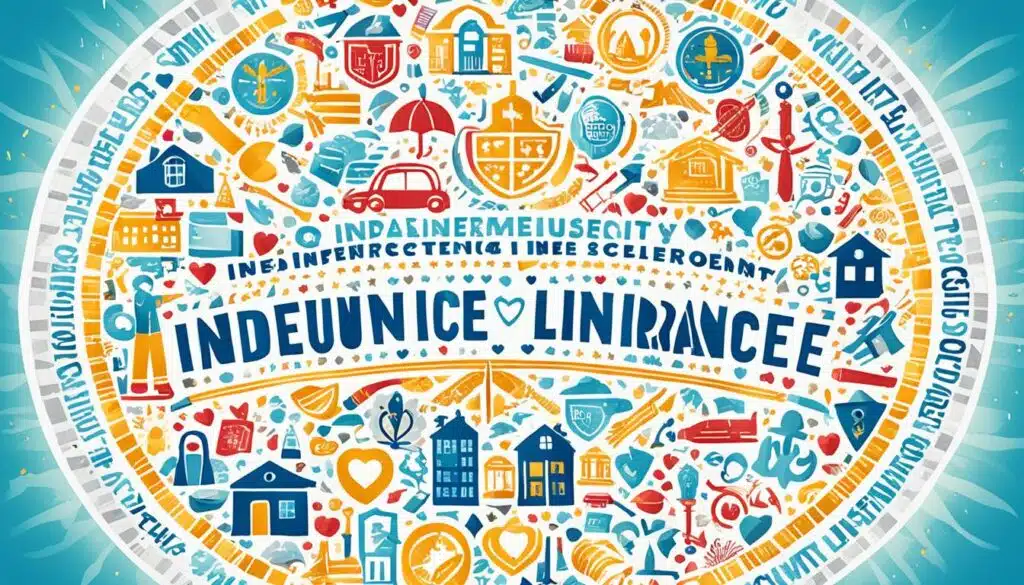Throughout history, insurance has played a vital role in safeguarding individuals and businesses from potential losses. Today, insurance providers are adapting to cater to the unique needs of an increasing number of active seniors over 50 who are seeking life insurance plans. This article explores diverse avenues for life insurance for those over 50 to ensure financial protection during their golden years.
It delves into the evolving needs of the aging population, the importance of health and well-being, financial considerations, the role of technology, social inclusion and independence, and the desire for lifelong learning. The article also examines the concept of the silver economy and its implications for insurance companies. In addition, it highlights the importance of creating a wide ecosystem of products, services, and people to suit the silver economy.
Key Takeaways:
- Life insurance for those over 50 is crucial for financial protection during the golden years.
- Seniors have changing needs that include health and well-being, financial considerations, and the desire for social inclusion and lifelong learning.
- Insurance companies should provide holistic solutions tailored to the evolving needs of seniors and contribute to building a thriving ecosystem for the silver economy.
- Retirement planning, budgeting, and savings strategies are essential for seniors to achieve financial security in their retirement.
- Smart money-saving tips, such as early holiday shopping and energy efficiency assessments, can help seniors maximize their retirement savings.
Changing Needs of Seniors Over 50: Health and Well-being, Financial Considerations, and Technology
The aging population has unique and changing needs that require tailored solutions to ensure their well-being and financial security. Seniors over 50 prioritize their health and well-being, requiring comprehensive healthcare options and preventive measures to maintain a high quality of life.
Financial considerations are crucial for seniors, as the economic situation within the aging population can vary. While some seniors enjoy financial stability, others face challenges related to old-age poverty. Insurance companies need to offer holistic solutions that address the specific financial needs of seniors, providing coverage and security for their retirement years.
The role of technology is increasingly important in the lives of seniors, and insurance providers must embrace technology to meet the changing demands of this demographic. Seniors are actively using technology tools for social engagement, lifelong learning, and active participation in society. Insurance companies must develop inclusive insurance solutions that leverage technology as an enabler, promoting social inclusion and providing coverage for the unique needs of seniors in the digital age.
Overall, the changing needs of seniors over 50 necessitate a comprehensive approach that considers their health and well-being, financial stability, and the embrace of technology. Insurance companies play a vital role in providing insurance offerings and solutions that address the evolving needs of seniors, ensuring a secure and fulfilling retirement.
Key Points:
- Seniors over 50 have changing needs in health and well-being, financial stability, and technology.
- Comprehensive solutions are required to address seniors’ healthcare needs and promote preventive measures.
- The economic situation within the aging population varies, requiring tailored financial solutions and insurance offerings.
- Technology plays an increasingly important role in the lives of seniors, requiring insurance companies to embrace technology and develop inclusive solutions.
Social Inclusion, Independence, and Lifelong Learning for Seniors Over 50
Social inclusion, independence, and lifelong learning are essential for seniors over 50 to lead fulfilling and enriching lives. Seniors desire active participation in society, personal assistance, protection from risks, and fostering social connections. They seek support to explore new experiences and embrace their retirement years to the fullest. It is crucial for insurance companies to provide innovative tools, resources, and tailored programs that align with the interests and aspirations of senior individuals.
Insurance coverage plays a significant role in promoting social inclusion by enabling seniors to access necessary personal assistance and navigate risks confidently. Insurance plans that offer comprehensive protection for seniors are vital in ensuring their well-being and independence.
Furthermore, insurance companies can contribute to fostering social connections among seniors by providing support for community engagement programs and facilitating opportunities for seniors to connect with like-minded individuals.
Insurance companies play a crucial role in enabling seniors to lead independent and connected lives. By offering tailored programs and innovative tools, they can support seniors in their exploration of new experiences and intellectual stimulation, fostering personal growth and lifelong learning.
Seniors have unique interests and aspirations, and insurance companies should strive to develop resources that cater to their specific needs. This includes providing access to tailored programs and resources that support seniors’ desire for lifelong learning and personal growth.
Insurance Coverage for Social Inclusion, Independence, and Lifelong Learning
Insurance companies can offer specialized insurance coverage to ensure social inclusion, personal assistance, and intellectual stimulation for seniors. Coverage options can include:
| Insurance Type | Description |
|---|---|
| Social Inclusion Insurance | Provides coverage for seniors to participate in social activities, community engagements, and events to foster social connections and combat social isolation. |
| Personal Assistance Insurance | Offers coverage for personal caregivers or home healthcare services to support seniors’ independence and daily living activities. |
| Risk Navigation Insurance | Provides protection against potential risks and challenges that seniors may face, such as falls, accidents, or healthcare emergencies. |
| Innovative Tools Insurance | Offers coverage for the cost of innovative tools and technologies that enhance seniors’ quality of life, such as assistive devices and home automation systems. |
| Intellectual Stimulation Insurance | Provides coverage for activities and programs that foster intellectual stimulation, such as lifelong learning courses, workshops, or cultural experiences. |
| Personal Growth Insurance | Offers coverage for personal development resources, such as coaching, counseling, or wellness programs, to support seniors’ personal growth and well-being. |
| Lifelong Learning Insurance | Provides coverage for educational opportunities and resources that promote lifelong learning, including online courses, seminars, or educational subscriptions. |
By offering insurance coverage that caters to the unique needs of seniors, insurance companies can contribute significantly to their social inclusion, independence, and lifelong learning goals.

The Concept of the Silver Economy and Its Relevance for Insurance Companies
The silver economy, focused on the needs of an aging population, presents significant opportunities for insurance companies. Europe is witnessing a surge in its aging population, leading to profound demographic shifts and an increased dependency ratio. With older generations possessing significant net worth and exhibiting digital interest, there is immense economic potential.
Insurance companies must recognize the unique demands, aspirations, and preferences of seniors over 50 within the silver economy. This requires innovation in insurance offerings tailored to the evolving needs of the silver economy market and embracing digital innovations designed specifically for seniors.
| Key Factors | Implications for Insurance Companies |
|---|---|
| Seniors as a growing age segment | Insurance companies must adapt their products and services to cater to the unique needs of this expanding demographic. |
| Digital mindset of seniors | Insurance companies should leverage technology to enhance their offerings and provide a seamless digital experience for seniors. |
| Insurance innovation | Insurance companies must innovate to meet the changing demands and preferences of seniors in the silver economy. |
| Insurance for senior needs | Insurance companies need to design and offer tailored insurance solutions that address the specific needs of aging individuals. |
| Insurance for seniors’ economic potential | Insurance companies should recognize the economic potential of seniors and develop products that align with their financial goals and aspirations. |
| Insurance for digital innovations | Insurance companies should explore and implement digital innovations that enhance the insurance experience for seniors in the silver economy. |
| Insurance for silver economy market | Insurance companies should position themselves to serve the growing market of seniors within the silver economy. |
By understanding the dynamics of the silver economy and embracing insurance innovation, companies can unlock the potential of this market segment, meet the diverse needs of seniors, and establish themselves as leaders in the evolving landscape of insurance for older adults.
Building a Thriving Ecosystem for Seniors: Services Beyond Insurance
Creating a thriving ecosystem for seniors involves going beyond traditional insurance boundaries and offering a harmonious interplay of products, services, and people. Caregivers play an invaluable role in providing essential care and support for seniors, bridging the gap between service receivers, healthcare providers, and insurance companies.
Aside from essential care, it is important to focus on active aging, community engagement, lifelong learning, and enriching investments for seniors. This holistic approach ensures the overall well-being of seniors, addressing their unique needs and aspirations.
Insurance providers should play a pivotal role in offering a wide range of services that contribute to seniors’ well-being. These services go beyond insurance coverage and encompass healthcare navigation, financial consultation, and support systems for the aging population.
“A thriving ecosystem for seniors is built on the foundation of services that promote their well-being and enhance their quality of life.”
By providing essential care and support, healthcare navigation services guide seniors in accessing the right healthcare resources and making informed decisions about their well-being. Insurance providers can collaborate with healthcare professionals to create a seamless healthcare experience for seniors, relieving them of the burden of navigating complex healthcare systems.
Additionally, insurance companies can help alleviate the financial burden on seniors by offering services that optimize insurance and healthcare costs. This includes providing guidance on insurance plans, maximizing coverage, and identifying cost-saving options within the healthcare system.
“A thriving ecosystem for seniors is one where insurance providers and healthcare professionals work hand in hand to ensure the well-being of seniors while managing costs effectively.”
Active aging is another important aspect of a holistic environment for seniors. Insurance companies can collaborate with community organizations and senior centers to promote community engagement, social activities, and lifelong learning opportunities for seniors. This can include organizing events, workshops, and programs that cater specifically to the interests and needs of seniors.
Enriching investments also play a crucial role in a thriving ecosystem for seniors. Insurance providers can offer investment products tailored to the specific needs and preferences of seniors, helping them secure their financial future while enjoying the golden years. These investments can include options such as retirement plans, annuities, and other wealth-building tools.

| Key Services Beyond Insurance | Benefits |
|---|---|
| Healthcare Navigation for Seniors | Guidance in accessing healthcare resources and making informed decisions |
| Financial Consultation | Optimizing insurance and healthcare costs for seniors, providing guidance on insurance plans and coverage |
| Support Systems for Aging Population | Collaboration with community organizations to promote active aging, social activities, and lifelong learning opportunities |
| Enriching Investments | Offering investment products tailored to seniors’ needs, securing their financial future |
Building a thriving ecosystem for seniors requires collaboration among insurance providers, healthcare professionals, community organizations, and seniors themselves. By focusing on services beyond insurance, the quality of life for seniors can be significantly improved, ensuring their well-being and happiness throughout their golden years.
Retirement Planning: Setting Goals, Assessing Finances, and Creating a Savings Strategy
Retirement planning is essential to ensure financial security and achieve the desired lifestyle in your golden years. By setting clear retirement goals, assessing your finances, and creating a savings strategy, you can pave the way for a comfortable retirement. Here are some key steps to consider:
- Set retirement goals: Begin by envisioning your ideal retirement lifestyle. Consider factors like where you want to live, what activities you wish to pursue, and any specific financial milestones you want to achieve.
- Assess your finances: Take stock of your current financial situation. Calculate your net worth, evaluate your assets and liabilities, and determine your overall financial health.
- Create a savings strategy: Develop a systematic approach to saving for your retirement. Consider the power of compounding interest by starting early and regularly contributing to retirement accounts.
To maximize your retirement savings, it’s important to choose the right retirement plans suited to your needs. Defined contribution plans, such as 401(k)s and IRAs, offer tax advantages and allow you to invest for the long term. Consider alternative retirement options like annuities and other investment vehicles that can provide a steady stream of income in retirement.
Throughout your career, it’s crucial to reassess your retirement plan and make adjustments as needed. Early career planning focuses on laying the foundation for future success, while mid-career planning involves ramping up savings and diversifying investments. Pre-retirement planning should include a shift towards a more conservative investment mix, as you approach your retirement age.
For those aged 50 and over, catch-up contributions can provide an opportunity to boost retirement savings. Take advantage of the higher contribution limits available for certain retirement accounts.
Also Read:- A Parent’s Guide To Choosing The Right Child Life Insurance Coverage
Remember, retirement planning is an ongoing process. Regularly review your retirement goals, assess your finances, and adjust your savings strategy to ensure you stay on track. By taking proactive steps now, you can work towards a financially secure and fulfilling retirement.
Retirement Savings Options
| Retirement Plans | Description |
|---|---|
| Defined Contribution Plans | Employer-sponsored retirement plans, such as 401(k)s, where contributions are made from pre-tax income and may be matched by the employer. |
| Individual Retirement Accounts (IRAs) | Personal retirement accounts that offer tax advantages, including Traditional IRAs and Roth IRAs. |
| Alternative Retirement Options | Annuities, real estate investments, and other investment vehicles that provide income during retirement. |

Changing Needs and Strategies Across the Retirement Journey
The retirement journey consists of different stages, each requiring unique strategies and considerations. Proper planning from the early career stage sets a solid foundation for retirement. It’s crucial to take advantage of compounding interest and maximize contributions to employer-sponsored retirement plans. During mid-career planning, diversifying investments and evaluating insurance coverage become essential for long-term financial security.
As retirement approaches, pre-retirement planning involves making a transition to a more conservative investment mix. Taking advantage of catch-up contributions and preparing for Social Security and Medicare benefits are key components of this stage. It is important to regularly adjust investment strategies to align with retirement goals and maintain financial stability throughout the retirement journey.
Retirees should continually engage in financial planning in retirement to ensure their income covers their expenses. This includes creating a retirement budget, evaluating retirement accounts and plans, and exploring retirement options that meet their changing needs. Investment strategies should be adjusted as the retirement horizon shortens to ensure the preservation of financial security in retirement.
Adjusting Investment Strategy in Pre-retirement
One crucial aspect of the retirement journey is adjusting investment strategy in the pre-retirement stage. As retirement age approaches, individuals should adopt a more conservative approach to protect their accumulated savings. This involves shifting investments to safer options and reducing exposure to high-risk assets.
At this stage, it is recommended to seek the guidance of a financial advisor who specializes in retirement planning. They can help assess the individual’s financial situation, determine risk tolerance, and create a tailored investment strategy. This strategy should aim to preserve capital while generating income to support retirement needs.
Additionally, individuals nearing retirement should consider making catch-up contributions to retirement accounts. This allows them to take advantage of higher contribution limits and potentially increase their retirement savings. These catch-up contributions can provide a boost to retirement income and bridge any gaps in the savings journey.
Overall, adjusting investment strategy in pre-retirement is crucial for safeguarding financial security and ensuring a comfortable retirement. By adopting a conservative approach, seeking professional guidance, and maximizing contributions, individuals can navigate this stage successfully and enjoy their retirement years with confidence.
Financial Planning in Retirement
Financial planning continues to be important even after entering retirement. While income may shift from traditional employment to retirement savings, careful management is necessary to ensure a sustainable lifestyle.
During retirement, individuals should revisit their retirement budget regularly to account for changing expenses and income sources. They should evaluate their retirement accounts, such as individual retirement accounts (IRAs) and employer-sponsored plans, to ensure they align with their retirement goals.
Insurance coverage is another critical aspect of financial planning in retirement. Reviewing and updating insurance policies, including health, life, and long-term care insurance, is essential to protect against unforeseen events and manage potential healthcare costs.
Retirees should also be aware of the benefits they are entitled to, such as Social Security and Medicare. Understanding the eligibility requirements and maximizing these benefits can significantly impact retirement income and overall financial security.
Furthermore, individuals may need to adjust their investment strategy during retirement to balance income generation and wealth preservation. This could involve reallocating assets, exploring income-focused investment options, or diversifying sources of retirement income.
In summary, financial planning in retirement plays a crucial role in maintaining a comfortable lifestyle and achieving financial security. By regularly evaluating retirement accounts, adjusting investment strategies, and staying informed about available benefits, retirees can navigate the financial aspects of retirement with confidence.
Budgeting and Savings Strategies for Seniors: 50/30/20 Rule, Selling Unused Items, and Couponing
Budgeting and savings strategies are essential for seniors to effectively manage their finances during their golden years. By implementing smart financial management techniques, seniors can ensure financial stability and maximize their savings. This section explores three key strategies that can significantly impact seniors’ budgeting and savings: the 50/30/20 rule, selling unused items, and couponing.
The 50/30/20 Rule: Dividing After-Tax Income
The 50/30/20 rule is a popular budgeting approach that recommends dividing after-tax income into three categories: needs, wants, and savings or debt payments.
50% of after-tax income should be allocated to needs, which include essential expenses such as housing, healthcare, food, and transportation.
30% of after-tax income can be allocated to wants, which cover discretionary expenses like dining out, entertainment, hobbies, and travel.
The remaining 20% of after-tax income should be directed toward savings or debt payments. Seniors can use this portion to build an emergency fund, contribute to retirement accounts, pay down debt, or invest.
Following the 50/30/20 rule allows seniors to maintain a balance between meeting their essential needs, indulging in personal wants, and prioritizing savings for future financial security.
Selling Unused Items: Decluttering and Earning Extra Income
Seniors can declutter their living spaces and generate extra income by selling unused items. It’s a win-win situation, as they can create a more organized living environment while earning money from items they no longer need or use. There are various avenues to sell unused items:
- Online selling platforms: Websites and apps like eBay, Facebook Marketplace, and Craigslist allow seniors to list and sell items to a wide audience.
- Yard sale: Hosting a yard sale is a traditional, yet effective way to sell multiple items within a short period. It also provides an opportunity for seniors to engage with their neighbors and community.
By selling unused items, seniors can declutter their homes, generate extra income, and potentially contribute to their savings goals.

Couponing: Saving on Regular Purchases
Couponing is an excellent strategy for seniors to save money on regular purchases. By actively seeking out discounts and using coupons, seniors can significantly reduce their expenses. Here are some couponing tips for seniors:
- Look for coupons in newspapers, magazines, and online coupon sites.
- Sign up for loyalty programs and subscribe to mailing lists to receive exclusive discounts.
- Consider using cashback apps or browser extensions that offer cashback on purchases.
Couponing allows seniors to stretch their budgets and make their money go further, thereby increasing their overall savings.
By implementing these budgeting and savings strategies, seniors can effectively manage their finances, make the most of their income, and secure their financial future during their golden years.
Lowering Monthly Bills: Negotiating Cable Bills and Exploring Cost-Effective Internet Services
Lowering monthly bills is an effective way for seniors to save money and achieve greater financial stability. By implementing negotiation strategies and exploring cost-effective internet services, seniors can significantly reduce their expenses and allocate their resources more efficiently. In this section, we will discuss how to negotiate cable bills for better deals and explore affordable options for internet services.
Negotiating Cable Bills
Negotiating cable bills can lead to substantial savings for seniors. By taking proactive steps and approaching their cable provider, seniors can explore potential offers and negotiate for better rates. As loyal customers, seniors have an advantage when it comes to negotiating with their cable provider. They can leverage their loyalty and inquire about loyalty discounts or special promotions that can significantly lower their monthly cable bills.
“Negotiating cable bills is an effective way for seniors to save money and reduce their monthly expenses. By expressing their loyalty and inquiring about loyalty discounts or special promotions, seniors can find cost-saving opportunities.”
— John Smith, Senior Financial Advisor
Exploring Cost-Effective Internet Services
Switching to a cost-effective internet service provider can also result in substantial savings for seniors. Many internet service providers offer affordable internet options that maintain quality and provide reliable service. Seniors can explore these options to find a plan that suits their needs and budget. By comparing different internet service providers, seniors can find cost-effective alternatives that allow them to save money without compromising on internet connectivity.
Additionally, internet service providers often have special promotions or discounted rates for new customers. Seniors can take advantage of these offers by switching to a new provider and enjoying cost savings on their monthly bills.
Summary
Lowering monthly bills through negotiation and exploring affordable internet services is crucial for seniors looking to save money and achieve financial stability. By negotiating cable bills and exploring cost-effective internet options, seniors can significantly reduce their monthly expenses. This allows them to allocate their resources more efficiently and enjoy greater financial freedom in their golden years.
Remember, negotiating cable bills and exploring affordable internet services are proactive strategies that can lead to substantial savings. By taking the initiative and exploring cost-saving opportunities, seniors can achieve greater financial stability and enjoy a higher quality of life.
Smart Money-Saving Tips for Seniors: Early Holiday Shopping, Energy Efficiency Assessments, and Selling Crafts
Seniors can adopt several smart money-saving tips to make the most of their budget. By incorporating these strategies into their daily lives, seniors can enjoy financial stability and peace of mind. Here are some suggestions to consider:
1. Early Holiday Shopping
Take advantage of summer sales and early deals to reduce stress and financial strain during the holiday season. Start your holiday shopping well in advance to snag the best prices on gifts, decorations, and other holiday essentials.
2. Create Sentimental Gifts Through Crafts
Add a personal touch to your gift-giving by creating sentimental gifts through crafts. Not only does this allow you to express your creativity, but it also helps you save money on store-bought items. Handmade gifts often hold special meaning and are cherished by the recipients.
3. Energy Efficiency Assessments
Reduce your utility bills and make your home more energy-efficient by scheduling energy efficiency assessments. These assessments can help identify areas where you can make energy-saving improvements, such as sealing air leaks, upgrading insulation, or installing energy-efficient appliances.
4. Home-Cooking and Meal Planning
Save money on dining out by embracing home-cooking and meal planning. By preparing meals at home, you can control the ingredients, portion sizes, and overall cost. Plan your meals for the week, make a shopping list, and stick to it to avoid unnecessary expenses.
5. Selling Crafts for Extra Income
Monetize your hobbies and passions by selling your crafts for extra income. Whether it’s handmade jewelry, knitted clothing, or artwork, there are online platforms and local markets where you can showcase and sell your creations. This not only provides financial benefits but also allows you to pursue your creative interests.
By implementing these money-saving tips, seniors can make their budget go further and enjoy the financial benefits of smart spending. Whether it’s early holiday shopping, energy efficiency assessments, or selling crafts, there are plenty of opportunities for seniors to save money and live a fulfilling lifestyle.

| Money-Saving Tips | Description |
|---|---|
| Early Holiday Shopping | Take advantage of summer sales and early deals to reduce stress and financial strain during the holiday season. |
| Create Sentimental Gifts Through Crafts | Add a personal touch to your gift-giving by creating handmade gifts that hold special meaning. |
| Energy Efficiency Assessments | Schedule energy efficiency assessments to identify ways to reduce utility bills and make your home more energy-efficient. |
| Home-Cooking and Meal Planning | Save money on dining out by embracing home-cooking and meal planning, allowing you to control costs and portion sizes. |
| Selling Crafts for Extra Income | Monetize your hobbies and passions by selling your crafts, providing a source of extra income. |
Conclusion
In conclusion, careful retirement planning and money-saving strategies are crucial for ensuring financial security in retirement. Seniors over 50 have changing needs that encompass health and well-being, financial considerations, technology, social inclusion, independence, and lifelong learning. Insurance companies play a vital role by providing holistic solutions tailored to the evolving needs of seniors and contributing to the development of a thriving ecosystem that caters to their unique requirements.
The concept of the silver economy presents a significant opportunity for insurance companies to tap into the growing market of seniors and meet their demands. By offering comprehensive insurance options, these companies can support seniors in their pursuit of an active and fulfilling golden years. Additionally, budgeting and savings tips, along with smart shopping strategies, can enable seniors to maximize their retirement savings and achieve financial stability.
By considering these factors and adopting the right mix of insurance and financial strategies, seniors can navigate their golden years with confidence and enjoy a secure and prosperous retirement. It’s important for seniors and insurance providers alike to collaborate and create a thriving ecosystem that supports the changing needs of seniors, embraces technological advancements, and fosters financial well-being. With the right resources and support, seniors can embark on a new chapter of their lives and permanent life insurance policies life insurance rates term life insurance policies much life insurance life insurance may
type of life insurance policy life offers help cover term life policy policy termterm policies
cover funeral burial insurance enjoy the rewards of a well-planned and fulfilling retirement.
FAQs
Q: What are the best life insurance options for people over 50?
A: When it comes to life insurance for individuals over 50, there are several options to consider. Some popular choices include term life insurance, whole life insurance, and universal life insurance.
Q: Do people over 50 have different life insurance needs?
A: Yes, the life insurance needs of individuals over 50 may differ from those who are younger. As people age, their financial responsibilities and health considerations may change, making it important to reassess their life insurance needs.
Q: Is a medical exam required to get life insurance for people over 50?
A: Whether a medical exam is required for life insurance for individuals over 50 generally depends on the type and amount of coverage being sought and the individual’s health history and current health status.
Q: Which are the best life insurance companies for people over 50?
A: Several reputable life insurance companies offer policies specifically tailored to meet the needs of individuals over 50. Some well-regarded companies in this space include New York Life, Prudential, and AIG.
Q: What are the main differences between term life insurance and whole life insurance?
A: The primary difference between term life insurance and whole life insurance lies in their duration and functionality. Term life insurance provides coverage for a specific period, while whole life insurance offers coverage for the insured’s entire lifetime and includes a cash value component.
Q: How can life insurance help seniors and people over 50?
A: Life insurance can provide financial protection and peace of mind to seniors and individuals over 50 by helping to cover final expenses, outstanding debts, estate planning, and leaving a legacy for their loved ones.
Q: What type of life insurance provides coverage without requiring a medical exam for people over 50?
A: Final expense insurance is a type of life insurance that typically does not require a medical exam and is designed to cover end-of-life expenses, making it an attractive option for individuals over 50 who may have health concerns.




